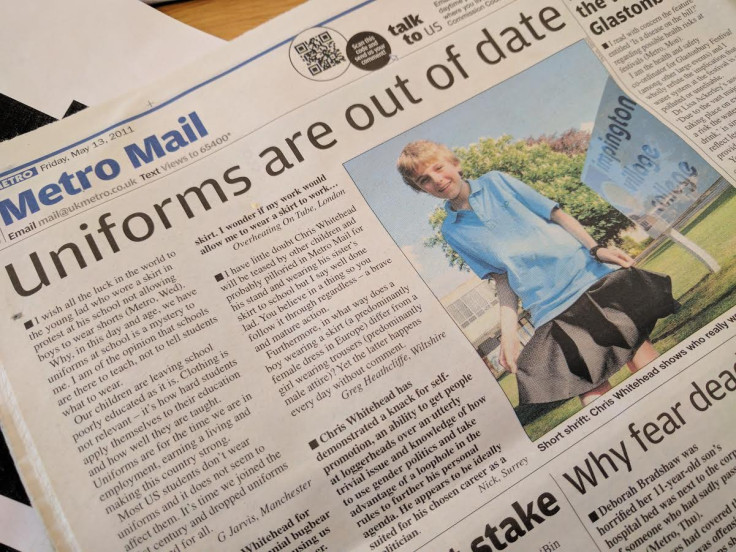I wore a skirt to school and it changed our uniform policy
Why are boys still having to make the same protest?

Summer has, as usual, brought with it an inevitable stream of news stories on the dress codes that stand in the way of people's attempts to stay cool. Whether jackets at Royal Ascot or trousers in school, the peculiar British dogma around dress codes leads to a string of battles that pitch formality and uniformity against practicality and comfort.
This week, dozens of boys at a school in Exeter wore skirts in protest against 'no shorts' rule. When I embarked on one such battle in 2011, at the age of 11, little did I imagine that this would capture the imagination of the world.
I had been a member of Impington Village College's student executive for a few months, and uniform had featured more than once in our meetings. This was a surprise as IVC is hardly a traditional red-brick learning environment. It is an international school that offers an open, liberal educational environment. Sweatshirts and polo shirts, not blazers and ties, were the order of the day, though not shorts. But the rules were loose – skirts could be worn, and there was no stipulation that only girls could wear them.
This was the opening I needed – joking that boys who were too hot wearing trousers could wear skirts, Principal Rob Campbell neither anticipated that anyone would take this suggestion seriously, nor that my simple campaign would provoke an international media storm.
As well as coverage in every mainstream news media, and local press across the UK, the story was picked up by Adrian Chiles on Daybreak, prompting a bare-legged presenter to host the breakfast show in a skirt. My campaign trended on Twitter, was picked up by Have I Got New for You and Radio 4's New Quiz, gained coverage in the international magazines and newspapers in more than 50 countries from Sweden to Somalia, and I was ultimately shortlisted for a human rights award by Liberty, the Campaign for Civil Liberties.
The letters and personal messages were overwhelming, ranging from a postcard from "your admirers in Reading" to offers of work experience from barristers. Around 90% were positive, applauding my willingness to stand up for what I believe in – while 10% thought otherwise. There were questions regarding my sexuality, and comments that I should be excluded from school for breaking the rules. Several cast aspersions on my upbringing: I received a frankly hysterical letter from a woman who told me she was glad I wasn't her child (would it be cheeky to say the feeling is mutual?).

The campaign was, of course, only the first stage in a long process of negotiations about wearing shorts – which then morphed into a wider discussion about uniform more generally, and ended up with governors revising school policy about nine months later. Boys could wear shorts – provided they were plain black with no logos and reached the knee – but also, everyone could wear plain black jeans if they wanted. In fact, this development that was even more welcome to students than the shorts.
Suggesting that dealing with bullying requires students to look and act alike is an admission of defeat.
So, the battle was won, but what about the war? The UK remains one of only two EU countries (alongside Ireland) where uniforms are the norm. And this, to me, is a pity. The standard justification for schools insisting on uniform is that it ensures equality; no one can be picked on for not wearing the 'cool' logos. But this argument simply doesn't stack up in an age where a child can far more easily be bullied for the phone they use than the clothes they wear. Take it from me, who was using a ten-year-old 'brick phone' until the age of fourteen.
Another common defence of uniform is that it prepares students for the workplace – a ludicrous notion, dispelled as soon as you ask someone to list the professions where uniforms are mandatory.
What's more, most sixth forms do not require uniform, despite their students being even closer to the world of work. And if non-uniform really did undermine student discipline, as proposed by some, then maybe we should cancel the charity 'Jeans for Genes' campaign – except that their promotion of non-uniform days earns vast sums to support those with genetic disorders, and to my knowledge, doesn't lead to the catastrophic breakdown of school discipline that the uniform police might fear.
In reality, uniform is a solution to few problems, but a cause of quite a few. Childhood should be about exploring oneself. How one looks can be a very strong influence on how young people think and feel. We should be encouraging children to be comfortable in their own skin; not to conform to standards set by a previous, very different, generation.
Suggesting that dealing with bullying requires students to look and act alike is an admission of defeat. That is precisely the aim of bullies – to force others to conform to their set of 'normal' standards.
Rather than make them wear uniforms, let's prepare students for work by giving them classes about our democracy, how to pay taxes, how to write a CV. And, in terms of discipline, stop worrying. While the first few days into a non-uniform regime might be slightly noisier, and maybe students would 'dress-to-impress' for a while, let's not forget that children are both adaptable and frankly, often quite lazy. These attitudes would fade quickly, and jeans and a T-shirt would, in most cases, become the true alternative to an enforced school uniform.
That schoolboys across the country are still fighting for something as simple as shorts in the summer is a reflection of what I see as a misguided attempt to maintain order. An innocent mistake, driven by the right intentions – but a mistake nonetheless. A drive for both formality and uniformity in schools will not resolve the issue of bullying, provides no preparation for the adult world, and in a school where high standards of behaviour are expected, will have little or no effect on school discipline.
We should start trusting students. Treating them more like adults with their own choices could lead to a more mature, emotionally-intelligent generation.
Chris Whitehead is a student at Queen Mary University of London
© Copyright IBTimes 2025. All rights reserved.




















